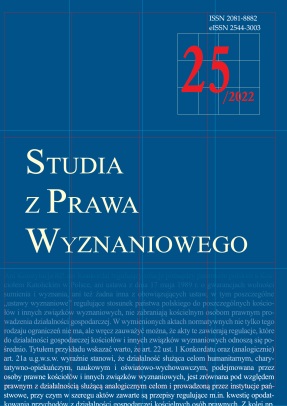Legal regulation of religious education in Ukraine: Implementation of the separation of the church and other religious organizations from state educational institutions
Legal regulation of religious education in Ukraine: Implementation of the separation of the church and other religious organizations from state educational institutions
Author(s): Oleksandr Bilash, Tetyana KarabinSubject(s): Law, Constitution, Jurisprudence, Constitutional Law, Civil Law, Human Rights and Humanitarian Law, Canon Law / Church Law
Published by: Katolicki Uniwersytet Lubelski Jana Pawła II - Wydział Prawa, Prawa Kanonicznego i Administracji
Keywords: freedom of religion; educational institutions; religious organizations; theological education
Summary/Abstract: This article, via an analysis of legislation, law-application practice, and individual elements of statistical information, reveals the implementation of the constitutional provision on the separation in Ukraine of the church (religious organizations) from the state and the school from the church. The authors state that the requirements of the constitutional legislation are not fully observed, and religious education at schools depends on religious organizations to a significant extent. The intensity and depth of the influence of religious organizations on educational institutions differs however at various levels of education and in different institutions. At the level of pre-school and general secondary education, due to state standardization and control, the sphere of autonomy of religious organizations in providing educational services is sufficiently narrow. At the level of higher education, in institutions founded by religious organizations, the educational process is carried out under the control of the religious organization itself, and the state and communal institutions (which train specialists majoring in theology) are under the aegis of the Ministry of Education and Science. Higher religious education (both that obtained in private institutions and that obtained in state or communal institutions) is de facto not separated from religious organizations, although the Constitution of Ukraine declares this. The confessional nature of theology is manifested in the content of academic courses and the organization of the educational process. In practice, however, the cooperation of churches with educational institutions is based on the need for the former to determine or at least influence the content of the training of their future ministers; for educational institutions, cooperation is a powerful tool for ensuring the employment of graduates of educational programs, and, respectively, directly affects the number of applicants.
Journal: Studia z Prawa Wyznaniowego
- Issue Year: 2022
- Issue No: 25
- Page Range: 107-127
- Page Count: 21
- Language: English

